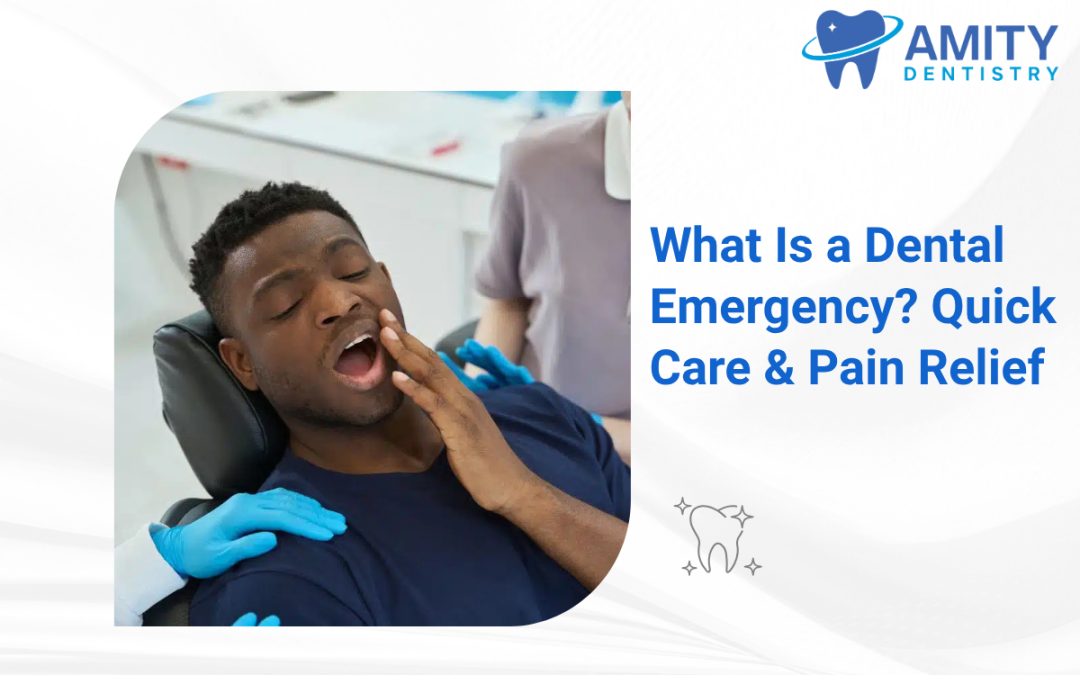Dental emergencies happen without warning. You might have a severe toothache, a chipped tooth, or sudden swelling. Knowing how to respond is important. Quick action can save a tooth, stop infection, or reduce pain. This guide explains what to do for different dental emergencies. You will learn the immediate steps to take before you see a dentist.
What Is a Dental Emergency?
A dental emergency needs immediate care. The goal is to stop pain, control bleeding, or save a tooth. These problems appear suddenly and get worse fast. Examples include bad toothaches, broken teeth, and abscesses. Swelling that makes breathing difficult is an emergency. Act when you have intense pain or bleeding that will not stop. Ignoring the problem leads to permanent damage or tooth loss. An infection can spread. Knowing what is an emergency gets you the correct care.
Why Immediate Action Matters
Your mouth contains many blood vessels and nerves. Small problems get worse quickly without treatment. A knocked-out tooth must be reimplanted within one hour for the best chance of survival. An untreated abscess causes a widespread infection. Immediate care reduces complications. It saves natural teeth and shortens recovery. Acting fast relieves pain. It also lowers your risk for expensive procedures. What you do right after an injury affects the final result.
Severe Toothache
A severe toothache signals a serious problem. Causes include cavities, infection, or a cracked tooth. The pain sometimes spreads to your jaw or ear. If you have a severe toothache, rinse your mouth with warm salt water. Do not put aspirin on your gums because it will burn them. You can take over-the-counter pain medicine for temporary relief. A cold compress on your cheek reduces swelling. These steps are not a cure. A toothache requires a dentist. Pain will not go away by itself. See a dentist to stop the infection and pain.
Knocked-Out Tooth (Avulsion)
A knocked-out tooth requires fast action. Stay calm. Pick up the tooth by the crown, which is the chewing surface. Do not touch the root. Rinse the tooth gently with water if it is dirty. Do not scrub it or use soap. Try to place the tooth back into its socket. Hold it in place with gentle pressure. If you cannot reinsert it, put the tooth in a container of milk. You can also hold it inside your cheek to keep it moist. You must see a dentist immediately. The cells on the tooth’s root begin to die within an hour. A quick response gives your tooth the best chance to be saved.
Broken, Chipped, or Cracked Tooth
You can break a tooth by biting something hard or from an injury. A small crack seems minor, but it exposes the tooth to bacteria. This leads to pain and infection. If you break a tooth, rinse your mouth with warm water. Apply a cold compress to your cheek to reduce swelling. Use clean gauze to apply light pressure if there is bleeding. Do not chew on the broken tooth. You need to see a dentist. A dentist will check the damage. Treatment depends on how deep the crack is. Prompt care stops the crack from getting worse and saves your tooth.
Lost Filling or Crown
A lost filling or crown exposes your tooth. The tooth becomes sensitive to temperature and pressure. If you lose a crown, save it and bring it to your dentist. You can buy temporary dental cement at a pharmacy. Use it to cover the exposed tooth. Do not eat hard or sticky foods. The tooth is weak without its protection. See a dentist soon. A delay puts the tooth at risk for more decay or damage. Your dentist will replace the restoration and protect the tooth.
Dental Abscess or Infection
A dental abscess is a pocket of pus from an infection. It forms at the tooth root or in the gums. Symptoms include severe pain, swelling, fever, and a bad taste. An abscess is a dangerous infection. It can spread throughout your body. If you think you have an abscess, rinse with warm salt water. This cleans the area. Do not try to pop or drain the abscess yourself. See a dentist immediately. You will need professional treatment, like antibiotics or a root canal, to clear the infection. Ignoring an abscess leads to serious health problems.
Soft Tissue Injuries
Injuries to your gums, tongue, or cheeks are soft tissue injuries. They often bleed a lot. To care for a soft tissue injury, first rinse your mouth with a mild salt water solution. Apply pressure with clean gauze to stop the bleeding. A cold compress helps with swelling. If the bleeding does not stop after 15 minutes, you need emergency care. A deep cut also requires a doctor or dentist. A professional should check the injury. This ensures there is no hidden damage to your teeth or jawbone.
When Something Gets Stuck Between Teeth
An object stuck between your teeth causes pain and pressure. Do not use sharp tools like a toothpick to remove it. You might damage your gums or teeth. Instead, use dental floss carefully. Slide it gently between the teeth to work the object out. Rinse your mouth with warm water after. If you cannot remove it, see your dentist. An object left between teeth causes inflammation and infection. A dentist can remove it safely.
Bleeding After Dental Procedures
Some bleeding is normal after a dental procedure like an extraction. Heavy or prolonged bleeding is not normal. To control bleeding, bite down on clean gauze for 20 to 30 minutes. Sit upright instead of lying down. Do not spit, rinse hard, or use a straw. These actions can dislodge the blood clot. If bleeding continues for longer than your dentist advised, call the dental office. You might need treatment to stop the bleeding and prevent infection.
How to Manage Pain and Swelling at Home
You can manage pain and swelling at home before seeing a dentist. Apply a cold compress to your cheek. This reduces swelling and numbs pain. You can take over-the-counter pain medicine like ibuprofen. Follow the directions on the package. Rinse your mouth with salt water to clean and soothe the area. Eat soft foods and avoid very hot or cold items. These are temporary solutions. Home care helps with symptoms, but a dentist must treat the cause.
Preventing Dental Emergencies
You can prevent many dental emergencies. Wear a mouthguard when you play sports. This protects your teeth from injury. Avoid chewing ice, hard candy, or other hard foods that can break teeth. Good oral hygiene is critical. Brush twice a day and floss daily. See your dentist for regular checkups. Your dentist in Pineville finds small problems before they become emergencies. Treating a small cavity is easier than treating an abscess. Prevention lowers your risk of a dental emergency.
Why Immediate Professional Care Is Necessary
Do not wait for a dental problem to go away. It usually gets worse. Seeing a dentist quickly saves you time and money. It also prevents serious complications. A dentist finds the source of the problem. Home remedies only address symptoms. A dentist can fix a broken tooth, treat an infection, and stabilize your injury. Getting fast dental care protects your oral health.
Knowing how to respond to a dental emergency protects your health. You can take steps to manage the situation until you see a dentist. Professional care is always required for an emergency. A dentist will diagnose the problem and provide the correct treatment. Taking action at home buys important time.
At Amity Dentist in Charlotte, we handle dental emergencies. Our team provides same-day care to relieve pain and protect your teeth. We treat sudden pain, broken teeth, and other dental trauma. Do not wait if you have a dental emergency in Charlotte? Our expert team is ready. Call 980-423-1244 and Book Now for your visit.

